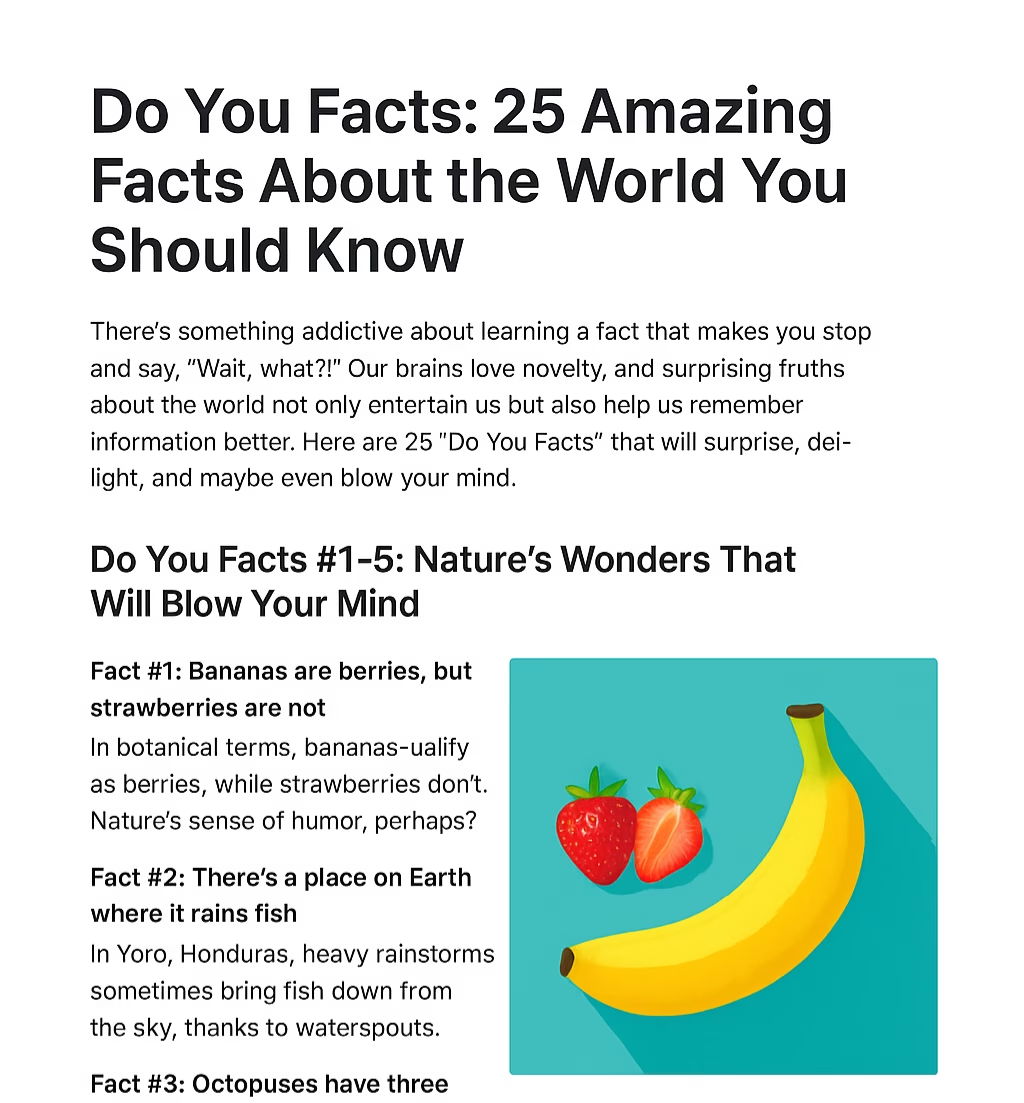Do You Facts – Discover 25 mind-blowing facts about the world, nature, history, space, and the human body that will leave you amazed and smarter.
Introduction: Why Fascinating Facts Make Us Smarter & Happier
There’s something addictive about learning a fact that makes you stop and say, “Wait, what?!”
Our brains love novelty, and surprising truths about the world not only entertain us but also help us remember information better.
Here are 25 “Do You Facts” that will surprise, delight, and maybe even blow your mind.
Do You Facts #1–5: Nature’s Wonders That Will Blow Your Mind
- Bananas are berries, but strawberries are not – In botanical terms, bananas qualify as berries, while strawberries don’t. Nature’s sense of humor, perhaps?
- There’s a place on Earth where it rains fish – In Yoro, Honduras, heavy rainstorms sometimes bring fish down from the sky, thanks to waterspouts.
- Octopuses have three hearts and blue blood – And when they swim, two of their hearts stop beating.
- Some trees can “talk” to each other underground – Through a network of fungi called the “Wood Wide Web,” trees share nutrients and warning signals.
- Water can boil and freeze at the same time – This strange event is called the triple point, and it happens under very specific conditions.
Also Read: Best Testing Tool for Automation
Do You Facts #6–10: Mind-Bending Human Body Facts
- Your stomach gets a new lining every 3–4 days – Otherwise, your stomach acids would digest it.
- The human nose can detect over a trillion scents – Far more than the 10,000 once believed.
- Your bones are stronger than steel – Ounce for ounce, bone is about five times stronger.
- You’re taller in the morning than at night – Gravity compresses your spine during the day.
- Your tongue print is unique, just like fingerprints – Which means, theoretically, you could be tongue-printed at a crime scene (but please don’t try).
Do You Facts #11–15: Historical Oddities You Won’t Believe
- Napoleon wasn’t actually short – He was about 5’6”, average for his time.
- Ancient Egyptians invented toothpaste – Their recipe included powdered ashes and burnt eggshells.
- The Eiffel Tower grows taller in summer – Metal expands in heat, adding about 15 cm.
- There was once a war fought over a bucket – The 1325 “War of the Oaken Bucket” between two Italian states.
- The Great Fire of London killed only 6 people – Despite destroying over 13,000 houses.
Do You Facts #16–20: Space Facts That Feel Like Science Fiction
- There’s a planet made of diamonds – 55 Cancri e is likely carbon-rich, making it a “diamond planet.”
- One day on Venus is longer than a year on Venus – Venus rotates extremely slowly.
- Neutron stars are so dense a teaspoon would weigh a billion tons – No gym membership required.
- The Sun accounts for 99.86% of the solar system’s mass – Everything else is just crumbs in space.
- Space smells like burnt steak – Astronauts report a “metallic, meaty” aroma after spacewalks.
Do You Facts #21–25: Fun, Quirky, and Totally Random Facts
- Wombat poop is cube-shaped – Helps it stay put and mark territory.
- Scotland has 421 words for snow – From “sneesl” (snowstorm) to “skelf” (a large snowflake).
- Sharks existed before trees – Sharks are over 400 million years old.
- There’s a species of jellyfish that is immortal – Turritopsis dohrnii can revert to its juvenile stage.
- The shortest war in history lasted 38 minutes – Between Britain and Zanzibar in 1896.
FAQs About Do You Facts
Q1: What are “Do You Facts”?
A: Short, surprising truths about the world that spark curiosity and make learning fun.
Q2: Are these facts scientifically accurate?
A: Yes, these are verified from reputable sources, though some may sound unbelievable.
Q3: Why do people love random facts?
A: They activate curiosity and often challenge what we think we know.
Q4: Can learning facts improve memory?
A: Absolutely—our brains retain surprising info better than routine details.
Q5: How can I share these facts?
A: Post them on social media, use them in trivia games, or impress friends at dinner parties.
Q6: Do these facts change over time?
A: Some do—new research can reveal updated truths or debunk old myths.



















Join Us on Social Media!
Stay updated with the latest from EasyBuzz. Connect with us: